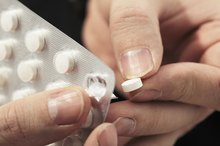How to Cure or Prevent Microalbuminuria
Microalbuminuria refers to the appearance of small, abnormal amounts of albumin, a protein present in the blood, in the urine. Albumin should not "leak" into the urine unless the kidney has some damage. Microalbuminuria can be the first sign of nephropathy, or kidney disease, and cardiovascular disease. Other causes of microalbuminuria are glomerulonephritis, another kidney disease, or kidney infections. Possible causes of this condition are high blood pressure, family history of diabetic kidney disease, smoking and being overweight. Microalbuminuria is treated and prevented in a variety of ways including lifestyle changes and medicine.
Preventing and Curing Microalbuminuria
Stop smoking cigarettes, which can induce albuminuria and accelerate renal failure in diabetics. Seek counseling for cigarette addiction, ask a friend for help, speak to your health care provider and get rid of all your remaining packs of cigarettes.
Can You Strengthen Your Kidneys?
Learn More
Exercise at the gym to control and reduce blood sugar levels and hypertension, associated with microalbuminuria. You can prevent any further kidney damage by reducing your weight, blood pressure and cholesterol levels achievable through diet and exercise. Attempt to exercise five days a week for at least 30 minutes. Take notes in your health journal about your workout routine for that day such as the exercises you performed.
Eat healthy. This can prevent more kidney damage by reducing your weight, controlling your blood sugar and by improving hypertensive conditions. You should eat at least five portions of fruit and vegetables a day, choose starchy carbohydrates that are low on the glycemic index and reduce the amount of fat, sugar and salt in your diet. Write in your food journal what you are eating so you are aware of your own diet.
How to Lose Weight Using Glucophage
Learn More
Consult a dietitian if you have microalbuminuria associated with kidney disease. You might need to limit certain foods from your diet that contain high levels of protein, sodium, potassium or phosphate. Your food diary can assist both you and your dietitian in determining what foods you are eating and what you can add or remove from your diet.
Speak to your health care provider about medications for microalbuminuria. ACE inhibitors and angiotensin receptor blockers can be used to slow kidney damage and reduce your blood pressure. ACE inhibitors are recommended for most people with diabetes, high blood pressure and kidney disease.
Take a low-dose aspirin daily. Aspirin has been shown to lower blood pressure, which improves kidney health in type 2 diabetics.
Write daily in your health journal about your diet, exercise and other matters related to changing your lifestyle. This will allow you to recap and keep track of the changes in your habits and the progress being made. Also, keep note of any mistakes during the day, such as eating candy or not going to the gym like you planned. Tracking your past failures can remind of your present and future goals and how to possibly overcome upcoming potential obstacles.
Tips
You should partner with a friend or family member to motivate lifestyle changes and to provide help in the future.
Warnings
Speak to your health care provider before beginning any steps toward treating microalbuminuria.
Related Articles
References
- Pub Med: Smoking is Related to Albuminuria and Abnormal Renal Function in Nondiabetic Persons
- National Kidney Foundation: Microalbuminuria In Diabetic Kidney Disease
- Diabete Suffolk: Microalbuminuria
- BUPA: Microalbuminuria
- Journal of the American Society of Nephrology: Prevention and Treatment of Diabetic Nephropathy: The Program for Irbesartan Mortality and Morbidity Evaluation
Resources
Writer Bio
Jay Jay Waltz has been writing professionally since 2009, focusing on health, wellness and nutrition. He has written for various online publications. Waltz is a National Academy of Sports Medicine-certified personal trainer while undergoing corrective rehabilitation training. Waltz also holds a Bachelor of Science in public health environmentalism from the Southern Connecticut State University.









